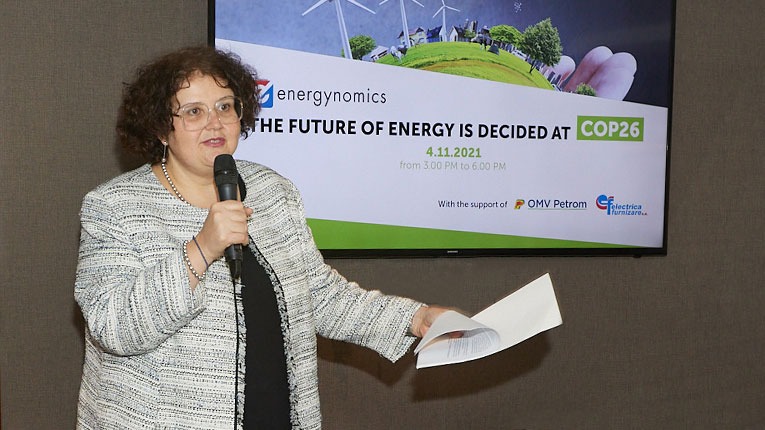The COP26 reunion is underway for another few days, in Glasgow, and all the huge assembly of world leaders and experts might be well summarized in two words, believes Anna Akhalkatsi, World Bank Country Manager for Romania. In an exclusive top-level conversation proposed by Energynomics, she spoke about ambition and action, but also about the potential that Romania has in terms of transition to a green, sustainable society.
Ambition and action are the words “we will keep hearing”, as there are extraordinary moments we are living; the world is still grappling with the impacts of the COVID-19 pandemic, and yet we are looking at our leaders to make further commitments to important goals for the transition to net-zero emissions.
In terms of energy, eliminating one-third of global emissions “will require retiring more than 100 gigawatts of coal capacity each year for the next 20 years which means the world needs to roughly close one power plant every day until 2040”, Anna Akhalkatsi said.
She highlighted that the green transition has to happen while there is increasing energy demand from the emerging markets, as “they have growing and unmet energy demand”. “How do we do it in a way that will allow all countries to still develop and people to have a just transition, not just one for the sake of transition?”, she asked.
It is nice that there are some successful accomplishments in the world, in the EU, and Romania, but still, we see lots of countries where we still have fuel subsidies, carbon is too lightly taxed in many environments and still, decisions need to be taken to both decommission the existing fleet of, for example, coal-fired power plants and to stop the construction of new ones”. Looking at COP26, “we want to see the political commitment to realistic and fair transition”, to transform not only the energy sector but entire economy.
There are three ingredients for success, Anna Akhalkatsi noted. “One is policy frameworks, second is financing and then, the availability of technologies and solutions”.
Well-designed power markets, demand-side management and digitalization, all can help us reduce the cost of electricity. “Unfortunately, only a third of countries worldwide have developed adequate legal frameworks and policies for renewable energy at this point. When we look at financing, we all know that enabling policies to unlock investments will require trillions of dollars in additional investments, and these cannot come only from grants and concessional resources. We need private sector financing and for that, we need to mobilize public, private and development finance at scale and design sophisticated financial instruments to unlock high-impact projects.” In respect to technology, the World Bank official mentioned the Glasgow Breakthroughs, commitments by the countries to develop and deploy clean technologies throughout the world.
Romania did make important progress in the past, Anna Akhalkatsi said. “The country still needs further consolidation, reforms and deepening of regional integration to accelerate its energy transition and to meet the objectives set under the EU clean package and the EU Green Deal, as well as to benefit from system efficiency gains”, she stressed. Romania’s recent actions for decommissioning the most polluting coal power plant in Romania, the Mintia power plant, along with its plans to also close two units at the Oltenia Energy complex represent “a very clear message to show the clear commitment of the country”. However, “what is very important and a remaining challenge is that the power sector increases the pace of capacity additions to balance the pressures that stem from decommissioning of old and polluting coal-fired plants. […] In the past, there was good progress with the development of renewables but unfortunately, the pace has stagnated over the last five years and more policy support is needed to create an adequate, enabling environment for the private sector participation, as well as to support the country’s fair transition away from coal”.
Beyond the electricity sector, most heating utilities at the municipal level are facing financial distress and require support to transition to sustainable heating models, including policy guidance and capacity building. Energy intensity in Romania is declining, but it’s still high, still above the European average, so there is still “a huge and untapped potential on the energy efficiency side”, Anna Akhalkatsi said, mentioning the long-term building renovation national strategy (in Romanian) drafted with World Bank support.
Ms Akhalkatsi also mentioned the need to strengthen the policy and governance frameworks in the energy sector. “The World Bank will continue to support the design and implementation of the energy transition agenda and the optimization of the energy markets, to define a more sustainable future for Romanians. In this effort, we coordinate with all the other development partners, including the EU, through DG Reform, DG Energy and DG Competition. We will soon be rolling out one new product that the World Bank recently developed, which is called the Country Climate Development report. This is a diagnostic [tool] that will look at identifying and prioritizing actions that meaningfully reduce GHG emissions, build adaptation and resilience, and support the achievement of Nationally Determined Contributions known as NCDs [which identify the post-2020 voluntary national climate targets, including mitigation and adaptation, editor’s note] and long-term strategies.”
In addition to delivering on finance, a strong theme for the World Bank in COP26 is its effort to ramp up support for green, resilient and inclusive recovery from the COVID-19 pandemic, as well as low carbon transition that puts people at the centre, said Anna Akhalkatsi. “I think where the Bank can come in is to continue to support [Romania] to turn its ambitions into actions […] because this energy crisis sends a clear call for action to accelerate the energy transition and to decarbonize the economy in Romania and globally”.
